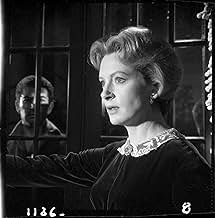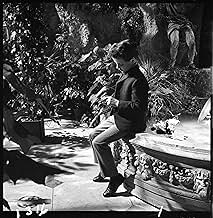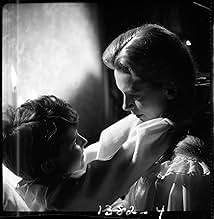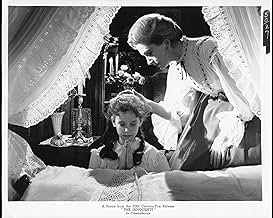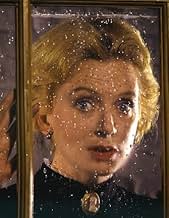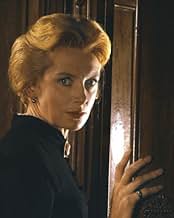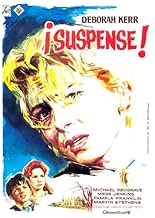VALUTAZIONE IMDb
7,7/10
35.003
LA TUA VALUTAZIONE
Una giovane governante si convince che la casa è posseduta.Una giovane governante si convince che la casa è posseduta.Una giovane governante si convince che la casa è posseduta.
- Regia
- Sceneggiatura
- Star
- Nominato ai 2 BAFTA Award
- 4 vittorie e 5 candidature totali
Recensioni in evidenza
Miss Giddens (Deborah Kerr), a nineteenth century British governess, is appointed to take care of two children, Flora (Pamela Franklin) and Miles (Martin Stephens). Upon arriving at the bleak mansion she meets the housekeeper (Megs Jenkins) and also Flora. Miles arrives a few days later from school. The children seem like little angels but, following a series of bizarre events and examples of the children's wicked impulses, Miss Giddens begins to suspect that all is not what it seems.
This dark and atmospheric tale is a wonderful example of how to create an admirable horror movie that, although has violent undertones, features very little violence when all is said and done. The Innocents' is certainly a psychological horror movie which leaves in doubt how much of the inexplicable happenings are supernatural, and how much is in the mind of the protagonist, Miss Giddens. Director Jack Clayton uses some astonishing visual trickery and ghostly effects to create and maintain a very unsettling atmosphere, almost from the very beginning. A number of effective ghostly apparitions are displayed on screen during the movie from varying distances which gives The Innocents' a constant, foreboding atmosphere. The way some scene changes blend with the end of the previous scene are rather disconcerting and almost dream like as there are long lingering images, once again, wholly adding to the effect. Some of the dialogue may seem a little unrealistic, but in general the movie is well scripted and features a few very dramatic scenes thanks to some delightfully written dialogue and strong acting performances. William Archibald and Truman Capote both won awards for their script writing.
The only real fault with The Innocents' is how fast the film moves along. Miss Giddens seems to realise the truth of what is happening all too quickly. This does not make The Innocents' less enjoyable, but it would have been nice to have had an extra ten minutes or so explaining the story to us a bit more. The Innocents' has a sustained tone of dread throughout the movie. It seems that Miss Giddens is unable to move without being confronted by some spectre or seeing some rather peculiar behaviour exhibited from the children. I'd compare the dark atmosphere with that of The Haunting' (1963), both movies are comparable in the way they are presented and are both aesthetically pleasing. The acting was of a high standard, though one must forgive the two young performers if they occasionally seemed to overact. Martin Stephens was very good as Miles, playing his sinister part with an awful power, even though the character's superciliousness became somewhat of an annoyance. Megs Jenkins was also delightful as the anxious housekeeper Mrs. Grose. From the moment Mrs. Grose is first introduced the viewer can begin to suspect something. Jenkins came across as a friendly, but scared, woman who is desperate to maintain decorum in the house. A fine performance suited her character marvellously. One must also mention Deborah Kerr's fine performance as Miss Giddens as she played it with the right balance of inquisitiveness and fear. Deborah's dramatic performance certainly helped make this movie fantastic and one sympathises with her deeply as the film ends on the sombre and heartbreaking note that it does.
The Innocents' is an elegant and stylish movie that is certainly worth watching. Fans of The Omen' and Village of the Damned' should enjoy this as well as any fan of dark, atmospheric horror. A strong screenplay, fine performances and breathtaking visual trickery make this movie a very pleasing addition to the horror genre and I highly recommend it to all. The Innocents' was able to scoop a BAFTA Award (British Academy of Film and Television Awards) for Best British Film as well as a BAFTA nomination for Jack Clayton which he thoroughly deserved. My rating for The Innocents' - 8/10.
This dark and atmospheric tale is a wonderful example of how to create an admirable horror movie that, although has violent undertones, features very little violence when all is said and done. The Innocents' is certainly a psychological horror movie which leaves in doubt how much of the inexplicable happenings are supernatural, and how much is in the mind of the protagonist, Miss Giddens. Director Jack Clayton uses some astonishing visual trickery and ghostly effects to create and maintain a very unsettling atmosphere, almost from the very beginning. A number of effective ghostly apparitions are displayed on screen during the movie from varying distances which gives The Innocents' a constant, foreboding atmosphere. The way some scene changes blend with the end of the previous scene are rather disconcerting and almost dream like as there are long lingering images, once again, wholly adding to the effect. Some of the dialogue may seem a little unrealistic, but in general the movie is well scripted and features a few very dramatic scenes thanks to some delightfully written dialogue and strong acting performances. William Archibald and Truman Capote both won awards for their script writing.
The only real fault with The Innocents' is how fast the film moves along. Miss Giddens seems to realise the truth of what is happening all too quickly. This does not make The Innocents' less enjoyable, but it would have been nice to have had an extra ten minutes or so explaining the story to us a bit more. The Innocents' has a sustained tone of dread throughout the movie. It seems that Miss Giddens is unable to move without being confronted by some spectre or seeing some rather peculiar behaviour exhibited from the children. I'd compare the dark atmosphere with that of The Haunting' (1963), both movies are comparable in the way they are presented and are both aesthetically pleasing. The acting was of a high standard, though one must forgive the two young performers if they occasionally seemed to overact. Martin Stephens was very good as Miles, playing his sinister part with an awful power, even though the character's superciliousness became somewhat of an annoyance. Megs Jenkins was also delightful as the anxious housekeeper Mrs. Grose. From the moment Mrs. Grose is first introduced the viewer can begin to suspect something. Jenkins came across as a friendly, but scared, woman who is desperate to maintain decorum in the house. A fine performance suited her character marvellously. One must also mention Deborah Kerr's fine performance as Miss Giddens as she played it with the right balance of inquisitiveness and fear. Deborah's dramatic performance certainly helped make this movie fantastic and one sympathises with her deeply as the film ends on the sombre and heartbreaking note that it does.
The Innocents' is an elegant and stylish movie that is certainly worth watching. Fans of The Omen' and Village of the Damned' should enjoy this as well as any fan of dark, atmospheric horror. A strong screenplay, fine performances and breathtaking visual trickery make this movie a very pleasing addition to the horror genre and I highly recommend it to all. The Innocents' was able to scoop a BAFTA Award (British Academy of Film and Television Awards) for Best British Film as well as a BAFTA nomination for Jack Clayton which he thoroughly deserved. My rating for The Innocents' - 8/10.
The Innocents (1961)
The title loads this gun a little differently than the original from the long short story (or novella) by Henry James--The Turn of the Screw. But Jack Clayton's version of the story gets at the point with great ambiguity--uncertainty is key, and the suspense is partly under pressure because we don't quite know which side to take.
I can't say more, of course, because even a hint of a hint will start a viewer off on the wrong foot. But know that The Innocents is vigorously filmed in widescreen black and white, that Deborah Kerr, always a cool actress, is perfectly cool here (some might just say British, but she has no Julie Andrews in her governessing, and no Elizabeth Taylor in her at all). The two kids are both rather poised and charming as well as chilling, the boy especially intriguing for his precociousness (and preciousness). We empathize with all three equally, and yet, as you see, you can't quite see the events from their three pairs of eyes equally. Something is wrong, and you wait to see what, and how it will be revealed.
If it ever is. One of the brilliant things about Henry James is how you finish one of his books (the novels are better than the stories for this, I think) knowing what has happened but not knowing completely why. I mean, it all makes sense and feels right, but it feels suspended with an air of lingering needs. So you end up thinking about it later. As you will with this film.
There are some moments of special effects that are very well done even if a kind of 1950s/60s style of overlapping images and dreamer/dreamed simultaneousness. And the ghosts, not to give anything away, are pretty matter of fact. This is more an appreciation than a complaint, because the lack of gore, of cheap surprise, or of obvious scare tactics makes the movie a relief, and a bit of cinematic magic.
The title loads this gun a little differently than the original from the long short story (or novella) by Henry James--The Turn of the Screw. But Jack Clayton's version of the story gets at the point with great ambiguity--uncertainty is key, and the suspense is partly under pressure because we don't quite know which side to take.
I can't say more, of course, because even a hint of a hint will start a viewer off on the wrong foot. But know that The Innocents is vigorously filmed in widescreen black and white, that Deborah Kerr, always a cool actress, is perfectly cool here (some might just say British, but she has no Julie Andrews in her governessing, and no Elizabeth Taylor in her at all). The two kids are both rather poised and charming as well as chilling, the boy especially intriguing for his precociousness (and preciousness). We empathize with all three equally, and yet, as you see, you can't quite see the events from their three pairs of eyes equally. Something is wrong, and you wait to see what, and how it will be revealed.
If it ever is. One of the brilliant things about Henry James is how you finish one of his books (the novels are better than the stories for this, I think) knowing what has happened but not knowing completely why. I mean, it all makes sense and feels right, but it feels suspended with an air of lingering needs. So you end up thinking about it later. As you will with this film.
There are some moments of special effects that are very well done even if a kind of 1950s/60s style of overlapping images and dreamer/dreamed simultaneousness. And the ghosts, not to give anything away, are pretty matter of fact. This is more an appreciation than a complaint, because the lack of gore, of cheap surprise, or of obvious scare tactics makes the movie a relief, and a bit of cinematic magic.
Director Jack Clayton's masterpiece is a study of deepest dread. Its horror is the cinematic equivalent of rising damp.
Deborah Kerr accepts a job as the governess of two strange children (Martin Stephens and Pamela Franklin) and becomes convinced that they occupy a world haunted by repressed memories and the restless dead.
Martin Stephens' performance as the unfathomable Miles is extraordinary. The child projects a physical authority rare for his years. His dialog exchanges with Kerr run the gamut from highly amusing to deeply disturbing.
Clayton's greatest achievement is the way he subverts common household settings to the point where they become arenas of fear.
The sound design is chilling, conjuring sudden terror and thrusting us into the complex mechanics of the Kerr character's growing paranoia.
Strikingly shot and lit, the film is a textbook example of grave cinematic suggestion.
Deborah Kerr accepts a job as the governess of two strange children (Martin Stephens and Pamela Franklin) and becomes convinced that they occupy a world haunted by repressed memories and the restless dead.
Martin Stephens' performance as the unfathomable Miles is extraordinary. The child projects a physical authority rare for his years. His dialog exchanges with Kerr run the gamut from highly amusing to deeply disturbing.
Clayton's greatest achievement is the way he subverts common household settings to the point where they become arenas of fear.
The sound design is chilling, conjuring sudden terror and thrusting us into the complex mechanics of the Kerr character's growing paranoia.
Strikingly shot and lit, the film is a textbook example of grave cinematic suggestion.
The Innocents is a masterpiece of atmospheric horror cinema. The obvious influence for 2001's 'The Others', The Innocents portrays themes of paranoia, death and madness; superbly wrapped around a plethora of great performances from the four main leads.
The story revolves around an uncle who doesn't have time for the children he has inherited, and therefore hires Miss Giddens (Deborah Kerr) to look after them. When Miss Giddens arrives at the mansion, she first meets Flora, the young girl and is 'enchanted' by the child. A few days later the boy, Miles, arrives at the house after being expelled from school. The fourth lead is made up by the housekeeper, Mrs Grose; played by Meg Jenkins. From the housekeeper, Miss Giddens eventually learns of what happened to the previous occupants of the house, and that's where the fun starts...
Martin Stephens (Miles) and Pamela Franklin (Flora) do surprisingly good jobs as the two adorable young children that are the centre of the story. Their characters are portrayed as nice young children, but at the same time there is something sinister about them, and that is where the tale draws a lot of it's suspense and mystery from. Deborah Kerr also shines as the watcher of the children. We know from the outset that her character loves children, which makes her plight believable to the audience when she does all she can to save the children from the evil she believes is haunting them. We never really know what is happening in the movie; the children's viewpoints contradict that of Miss Giddens, and as there is evidence to support what both sides say, along with evidence to support that of the contrary, the mystery is able to build itself through this and that, therefore, along with the empathy we are able to feel for Mrs Giddens due to the nature of her character; the film is able to remain interesting and suspenseful for it's running time.
The thing that this film does best is in capturing a dark and foreboding atmosphere. Through the way the story is portrayed and the beautiful cinematography, Jack Clayton is able to create scenes and sequences that are genuinely frightening and suspenseful; less is more rarely works to a great effect, but here it does. The 'ghosts' have very little screen time, but the time they do have is powerful and memorable enough to make it seem like much more. The film's creepy and menacing atmosphere never delves into violence or gore and relies solely on the story itself and the Gothic, atmospheric setting; and that is much to the film's credit.
If you liked the slightly later 60's paranoid horror films, such as Carnival of Souls or The Haunting, then this film is definitely one to check out.
The story revolves around an uncle who doesn't have time for the children he has inherited, and therefore hires Miss Giddens (Deborah Kerr) to look after them. When Miss Giddens arrives at the mansion, she first meets Flora, the young girl and is 'enchanted' by the child. A few days later the boy, Miles, arrives at the house after being expelled from school. The fourth lead is made up by the housekeeper, Mrs Grose; played by Meg Jenkins. From the housekeeper, Miss Giddens eventually learns of what happened to the previous occupants of the house, and that's where the fun starts...
Martin Stephens (Miles) and Pamela Franklin (Flora) do surprisingly good jobs as the two adorable young children that are the centre of the story. Their characters are portrayed as nice young children, but at the same time there is something sinister about them, and that is where the tale draws a lot of it's suspense and mystery from. Deborah Kerr also shines as the watcher of the children. We know from the outset that her character loves children, which makes her plight believable to the audience when she does all she can to save the children from the evil she believes is haunting them. We never really know what is happening in the movie; the children's viewpoints contradict that of Miss Giddens, and as there is evidence to support what both sides say, along with evidence to support that of the contrary, the mystery is able to build itself through this and that, therefore, along with the empathy we are able to feel for Mrs Giddens due to the nature of her character; the film is able to remain interesting and suspenseful for it's running time.
The thing that this film does best is in capturing a dark and foreboding atmosphere. Through the way the story is portrayed and the beautiful cinematography, Jack Clayton is able to create scenes and sequences that are genuinely frightening and suspenseful; less is more rarely works to a great effect, but here it does. The 'ghosts' have very little screen time, but the time they do have is powerful and memorable enough to make it seem like much more. The film's creepy and menacing atmosphere never delves into violence or gore and relies solely on the story itself and the Gothic, atmospheric setting; and that is much to the film's credit.
If you liked the slightly later 60's paranoid horror films, such as Carnival of Souls or The Haunting, then this film is definitely one to check out.
They sure don't make movies like this one anymore. This is one of the few horror movies that does not have gory or graphic images in it. Instead, the spooks in this movie are presented in a subtle way....yet, the movie is quite scary. This is the type of horror movie that I like, one in which every now and then you see a frightening image or a startling scene, and that image or scene lingers in your mind.
Everything about this movie is haunting. First, there's the song at the beginning: you hear a young girl's voice singing a beautiful yet somber song. Later you hear that song in several scenes in the movie.
Second, there's the setting: this movie takes place in a large Victorian mansion with many rooms and passages, while only about eight people live in it....what could be more eerie than that?
Then there's the exceptional cinematography. The black-and-white photography is perfect for this movie. This movie would not have been too creepy if it had been done in color. Further, many of the shots were innovative and the lighting was used ingeniously in some of the scenes.
Additionally, I liked the way that the director chose to play around with the sound, which brought more of an element of mystery to the movie. In one particular scene, there was a lot of noise initially....and in a split second there was dead silence....then several seconds later, it was noisy all over again (all in the same scene).
But what I think is the most interesting thing about this movie is the fantastic performance by Deborah Kerr. It's fascinating to watch her facial expressions in this movie. She demonstrates her character's fear quite well.
I also think that the actor who plays Quint is very scary-looking! He has a very sinister look, and it adds to the spookiness of this movie. If you really want to be spooked by this movie, watch it late at night with all of the lights off....dare to watch it by yourself.
Everything about this movie is haunting. First, there's the song at the beginning: you hear a young girl's voice singing a beautiful yet somber song. Later you hear that song in several scenes in the movie.
Second, there's the setting: this movie takes place in a large Victorian mansion with many rooms and passages, while only about eight people live in it....what could be more eerie than that?
Then there's the exceptional cinematography. The black-and-white photography is perfect for this movie. This movie would not have been too creepy if it had been done in color. Further, many of the shots were innovative and the lighting was used ingeniously in some of the scenes.
Additionally, I liked the way that the director chose to play around with the sound, which brought more of an element of mystery to the movie. In one particular scene, there was a lot of noise initially....and in a split second there was dead silence....then several seconds later, it was noisy all over again (all in the same scene).
But what I think is the most interesting thing about this movie is the fantastic performance by Deborah Kerr. It's fascinating to watch her facial expressions in this movie. She demonstrates her character's fear quite well.
I also think that the actor who plays Quint is very scary-looking! He has a very sinister look, and it adds to the spookiness of this movie. If you really want to be spooked by this movie, watch it late at night with all of the lights off....dare to watch it by yourself.
Lo sapevi?
- QuizTo create such sharp visuals, director of photography Freddie Francis used lots of huge bright lamps. Deborah Kerr sometimes had to resort to wearing sunglasses between takes. He also had candles custom made with four or five wicks entwined to produce more light.
- BlooperAn obvious center back zipper in several of Miss Kerr's costumes, as well as in Mrs. Gross & Flora's costumes. The Innocents is set during the Victorian period, 1837-1901. Commercial zippers were not used in clothing until 1925.
- Citazioni
Miles: What shall I sing to my lord from my window? What shall I sing for my lord will not stay? What shall I sing for my lord will not listen? Where shall I go when my lord is away? Whom shall I love when the moon is arisen? Gone is my lord and the grave is his prison. What shall I say when my lord comes a calling? What shall I say when he knocks on my door? What shall I say when his feet enter softly? Leaving the marks of his grave on my floor. Enter my lord. Come from your prison. Come from your grave, for the moon is a risen. Welcome, my lord.
- Curiosità sui creditiThe film begins with a totally black screen and the sound of Flora singing for several seconds; then the 20th Century Fox logo fades in and out. The singing continues for a few seconds before the opening credits begin. As the credits display, we see an anguished Miss Giddens praying on the left side of the screen. Her actions are not explained until the film's climax.
- ConnessioniFeatured in Aweful Movies with Deadly Earnest: The Innocents (1974)
I più visti
Accedi per valutare e creare un elenco di titoli salvati per ottenere consigli personalizzati
Dettagli
- Data di uscita
- Paesi di origine
- Lingua
- Celebre anche come
- Posesión satánica
- Luoghi delle riprese
- Azienda produttrice
- Vedi altri crediti dell’azienda su IMDbPro
Botteghino
- Budget
- 430.000 £ (previsto)
- Lordo in tutto il mondo
- 30.411 USD
- Tempo di esecuzione
- 1h 40min(100 min)
- Colore
- Proporzioni
- 2.35 : 1
Contribuisci a questa pagina
Suggerisci una modifica o aggiungi i contenuti mancanti



